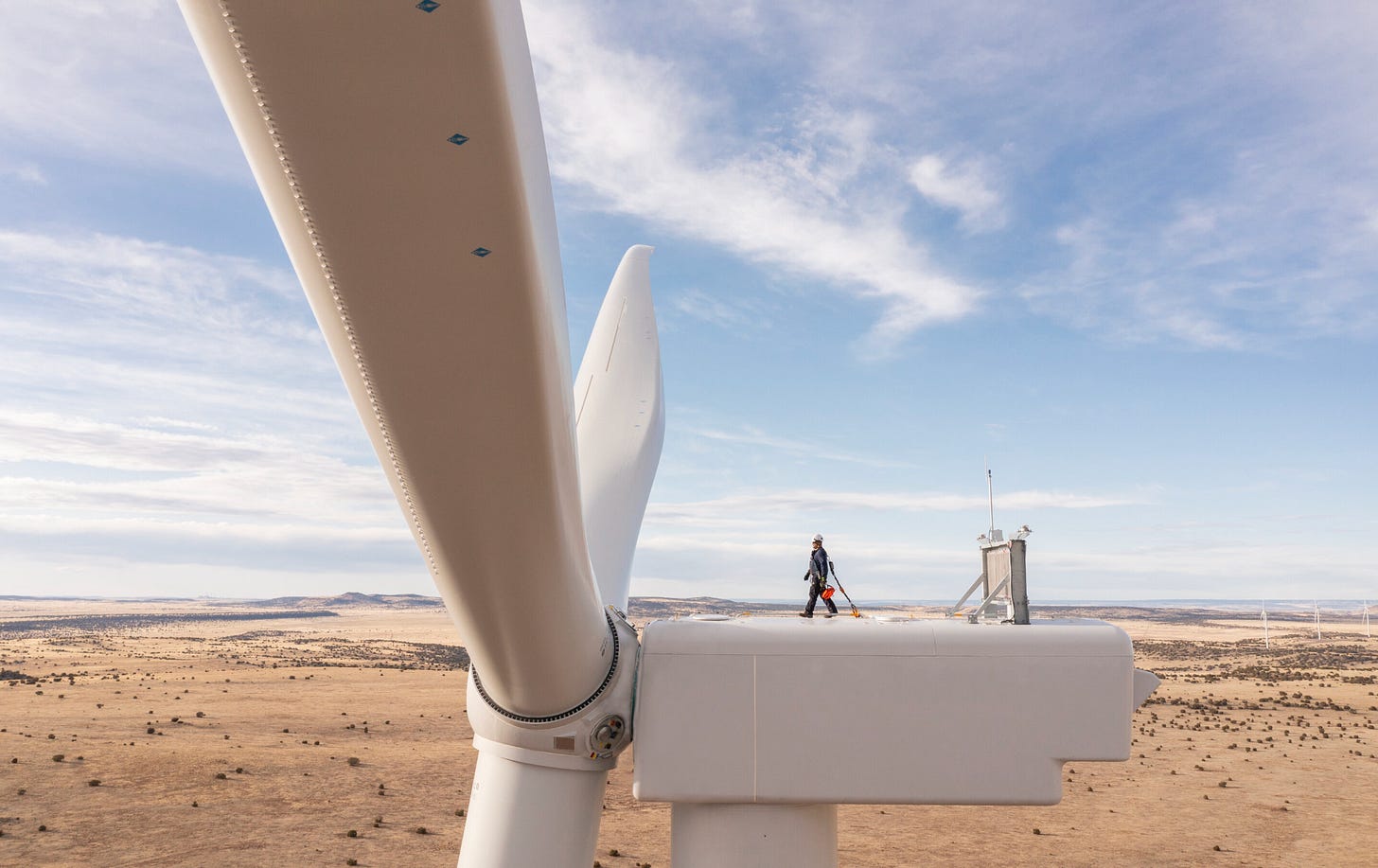GE Vernova, GM and the second-quarter earnings tariffs standoff
Welcome to Callaway Climate Insights, your daily guide to global climate finance. Has this report been shared with you? Please subscribe with the links below.
Today’s edition of Callaway Climate Insights is free for all our readers. We really want to bring you the best and latest in climate finance from around the world. Please subscribe now.
It’s the main question hanging over second-quarter earnings season this week, and so far, we’ve got two starkly different answers.
GE Vernova GEV 0.00%↑ shares soared almost 15% to their biggest one-day gain ever yesterday after the energy giant said the impact of President Donald Trump’s tariffs will be on the low end of its guided range of $300 million to $400 million. But General Motors GM 0.00%↑ shares tanked the day before when it said the tariffs will add about $1.1 billion in materials and components costs to its balance sheet.
The whipsaw effects on investors will be the dominant story of the next two weeks of earnings season. In the first quarter, 411 of the S&P 500 companies cited the potential impact of Trump tariffs in their earnings statements. But this time, companies have actual impacts to talk about, and they can measure them better.
Trade deals such as the one the administration did with Japan this week will certainly help alleviate concern among investors and give them benchmarks to base future estimates on, but with tariff threats moving fast and furiously, there will still be uncertainty beyond the current third quarter.
How companies, particularly energy companies, respond will be of particular interest. Companies such as GEV, with big wind and solar components, were expected to be among the hardest hit in the tariff wars with China. While many may have blunted the impact of tariffs by stocking up on imports before the trade deadlines, that period is largely over now; another reason the latest earnings reports mean so much.
We’ll report back next week when more earnings reports have come in from the renewable industry, and like everyone else, be looking for a China deal.
Don’t forget to contact me directly if you have suggestions or ideas at dcallaway@callawayclimateinsights.com.
Follow us . . . .
Twitter | LinkedIn | Facebook | Instagram
Attacks on clean energy test resolve of climate investors
. . . . Nathan Mayer Rothschild, one of the scions of the Rothschild family banking dynasty, famously said after Napoleon’s loss at the Battle of Waterloo to “buy when there’s blood in the streets, even if it’s your own.” Potentially sound advice for climate investors who have been battered this year by attacks on renewable energy stocks, writes Mark Hulbert. Citing examples of specific renewable companies that have been crushed before but gone on to huge gains, Vestas Wind Systems (VWDRY) and First Solar FSLR 0.00%↑, Hulbert argues that if climate investors believe in the long-term potential of clean energy, they need to have the conviction to look past this era of White House hostility and focus on the impact of an expected energy transition on their portfolios.
Thursday’s subscriber insights
Return of the Flat Earth Society
. . . . Euphoria in climate circles this week as the United Nations International Court of Justice ruled in favor of a small, South Pacific island that global warming is an existential threat and that wealthy countries will be held responsible for their pollution and forced to pay damages if they are not.
The ruling on the case brought by Vanuatu was seen as even stronger than it could have been and will be a legal step toward further accountability by large polluters such as China, India and the U.S.
Enter the Trump administration, which has pulled out of all international climate agreements, is hostile to the UN, and typically ignores any legal ruling, even by the U.S. Supreme Court, unless it agrees.
While the rest of the world is celebrating climate progress with the ruling, the Trump team is pushing the Environmental Protection Agency to overturn a 16-year-old scientific finding that has become the basis for all U.S. environmental regulation. The “endangerment finding” of 2009 found that polluters such as oil and gas plants were indeed responsible for global warming and can therefore be regulated.
Rejecting this finding would be the equivalent, in our opinion, of simply hanging a Flat Earth Society sign up on the U.S. and thumbing our noses to the reality of what is occurring on a daily basis in the oil and gas industry. That hasn’t stopped this administration before.
It’s a funny old world when one respected court rules climate change is a threat to humanity and another regulating body simply says it’s not true.
How early environmental data challenges led to today’s AI frenzy
. . . . Some of the biggest environmental cleanup challenges of the 1980s and early 1990s spawned the data management ideas that are taking shape today in the form of the tech industry’s AI frenzy, writes Locus Technologies founder Neno Duplan in a guest post for Callaway Climate Insights. Duplan, whose company specializes in environmental software and solutions as well as sustainability management tools, said the challenges of collecting millions of data points and then trying to use them to develop strategies to clean up contaminated sites created the need for processing large bodies of information in quick and reliable ways. Decades later, and after several well-publicized environmental scares, those dreams are being realized not just through products such as ChatGPT, but in modern environmental systems.
Editor’s picks: ‘Coolcations’; plus, the puzzle of the missing plastic
Watch the video: With temperatures climbing across the northeast, some Americans are looking for cooler places to spend their summer vacations. They’re calling them “coolcations” — to places like Finland, where the summer is the favored season for American visitors. CBS News Boston reports.
They found all that missing plastic
Despite the fact that we now know there’s a lot of plastic — ranging from discarded duckies to microplastics — in our oceans, soil and even in our bodies, scientists have been concerned that there’s an enormous amount of plastic we have produced over the decades, but we don’t know where it went. Unfortunately, they just found a lot of it. Researchers from the Royal Netherlands Institute for Sea Research (NIOZ) and Utrecht University claim to be the first to provide a real estimate of ocean-polluting nanoplastics. Their research indicates that the North Atlantic Ocean alone hosts 27 million tons of floating plastic particles less than one micrometer in size, according to a report from Gizmodo. For reference, a single red blood cell is seven micrometers. Twenty-seven million tons is “a shocking amount,” scientist Sophie ten Hietbrink said in a NIOZ statement. “But with this we do have an important answer to the paradox of the missing plastic.”
Latest findings: New research, studies and projects
Lobbying in disguise
In this CESifo (Center for Economic Studies) working paper, the authors systematically examine whether and to what extent corporations in the United States with an interest in slowing climate action might have used corporate advertisement in media outlets as a strategic tool to align such outlets’ coverage with their views. From the abstract: “Based on several complementary empirical strategies, we find that advertisement spending by such actors increases during election periods and is associated with both lower and more skeptical-leaning coverage of climate change and climate policy.” Authors: Stefano Carattini, Georgia State University; Ulrich Matter, University of St. Gallen - Swiss Institute for International Economics and Applied Economic Research; Matthias Roesti, Harvard Business School; Swiss Institute of International Economics and Applied Economic Analysis, University of St. Gallen
More of the latest research:
Words to live by . . . .
“The fact is that no species has ever had such wholesale control over everything on Earth, living or dead, as we now have. That lays upon us, whether we like it or not, an awesome responsibility. In our hands now lies not only our own future, but that of all other living creatures with whom we share the Earth.” — David Attenborough.







